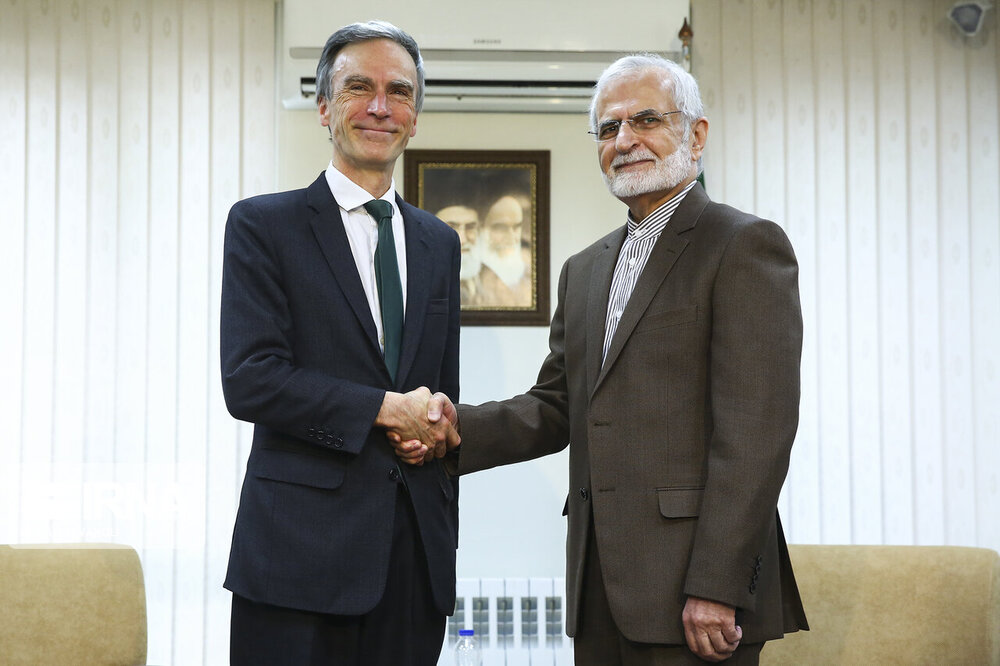Britain’s repeated words

TEHRAN - Kamal Kharrazi, chief of the Strategic Council on Foreign Relations, said on Sunday that Iran is serious about decisions related to the 2015 nuclear deal and will take new steps after the 60-day deadline.
On May 8, Iran announced a partial withdrawal from some aspects of the nuclear pact, saying that the country would no longer adhere to some of the limits on its nuclear activities. It also threatened to step up uranium enrichment if an agreement is not made within 60 days to protect it from the sanctions’ effects. The deadline ends on July 7.
Iran has threatened if a decision is not made by that date it will take the next steps.
“Three European signatories to the JCPOA [the Joint Comprehensive Plan of Action] have not taken serious actions. So, Iran will stop implementing some of its obligations based on the text of the JCPOA,” he told reporters after a meeting with British Minister of State for the Middle East Andrew Murrison.
Kharrazi said that the Europeans should dedicate more resources to INTEX and facilitate Iran-Europe interaction.
“We should see if Europe just gives promises or takes practical actions in the remaining time,” said Kharrazi who served as Iran’s foreign minister from 1997 to 2005 under the Khatami administration.
He said that Europeans have not much time to change the current atmosphere.
He noted that the Europeans should maintain their independence despite the U.S. pressure.
He said that Britain has expressed support for keeping the JCPOA, but these are “repeated words”.
On January 31, France, Germany and Britain, the three European parties to the JCPOA, announced the creation of INSTEX, a special purpose vehicle aimed at facilitating legitimate trade between European economic operators and Iran.
On March 20, Iran’s central bank governor Abdolnaser Hemmati announced that a mechanism similar to INSTEX has been registered in Iran, officially called the Special Trade and Finance Institute (STFI).
During a joint press conference with Foreign Minister Mohammad Javad Zarif in Tehran on June 10, German Foreign Minister Heiko Maas said, “We make efforts to make it possible to have economic cooperation with Iran. A financial mechanism called INSTEX has been devised in this respect.”
Maas said that the UK, France and Germany support the JCPOA. However, he said, “The position of our three European countries is that we support the JCPOA and we want to continue our commitments but we cannot expect miracles.”
In line with Tehran’s decision to scale back its commitments under the nuclear deal in protest to reimposition of sanctions, the Atomic Energy Organization of Iran (AEOI) announced on June 17 that Iran’s stockpile of enriched uranium will exceed 300 kilograms by June 27.
After June 27, Kamalvandi said, Iran will speed up its uranium enrichment activities beyond 3.67 percent if the other sides don’t take a practical step.
“After surpassing 300 kilogram, we will increase the speed of producing enriched uranium above 3.67 percent,” Kamalvandi stated.
Iran has insisted it will reverse its decision if it is shielded from sanctions.
‘Britain should avoid hasty conclusions’
Kharrazi also said that during the meeting with Murrison he protested about accusations British Foreign Secretary Jeremy Hunt leveled against Iran over attacks on two oil tankers in the Gulf of Oman.
“Such hasty conclusions and remarks will not help reduce tension and expand relations. If the British government seeks to reduce tension, it should avoid such hasty conclusions,” Kharrazi remarked.
On June 13, two commercial oil tankers were hit in the Gulf of Oman, prompting the evacuation and rescue of dozens of crew members.
The United States has blamed Iran for the attacks.
Hunt also issued a statement on June 14 blaming Iran and the Islamic Revolution Guard Corps for the attacks. He claimed no other state or non-state actor could have been responsible. The UK official, however, did not present any evidence for his claim.
On June 15, the Iranian Foreign Ministry summoned British Ambassador Robert Macaire over the accusations.
Assistant Foreign Minister for Europe Mahmoud Barimani conveyed Tehran’s strong protest to the British government’s “unfounded allegations” and “unacceptable” anti-Iran stances.
NA/PA
Leave a Comment